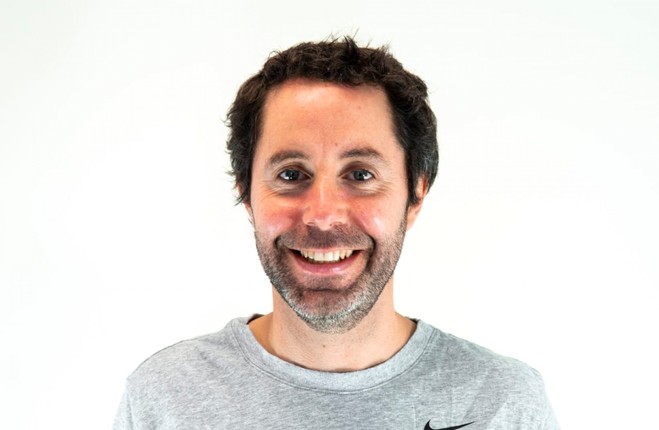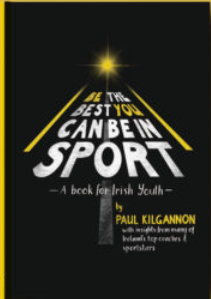TALENT PATHWAYS and professional sport, dealing with the maturing body, time and energy management, these are some of the many topics explored in a new book by Paul Kilgannon.
‘Be the Best You Can Be in Sport — A Book for Irish Youth’ follows on from Kilgannon’s first book ‘Coaching Children in Sport.’ In writing it, he says he was trying to create a “comprehensive resource for the young athlete,” which he felt had not been done before.
In addition to being an author, Kilgannon is also a sports coach, working with teenage athletes at local hurling club Carnmore in Galway, as well as serving as a coaching consultant. He is also the creator of the CARVER Coaching Framework, which, the book says, “is used internationally by coaches across multiple sports”.
‘Be the Best You Can Be in Sport’ also includes an impressive array of contributors — over 50 respected coaches, sports stars, coaching academics and sports science professionals.
Among the individuals that feature offering advice in the book are Henry Shefflin, Rob Heffernan, Kieran Donaghy, Rena Buckley, Stuart Lancaster, Billy Walsh, Mick McCarthy and Joey Carbery.
“I’m a primary school teacher by profession, but I job share, so I work week on week off,” Kilgannon explains. “Then I suppose my own coaching would have started in my club and I never really went too far away from it. I’m not terribly ambitious with coaching. I just coach in my own place, stay out there, enjoy that. To inform that, I started writing a coaching book, because I was deeply involved and that coaching book took on a life [of its own].
“So I wrote the coaching book at my own kitchen table, I created a framework for coaches to build a coaching world. I didn’t really know until it came out whether it was good, bad or indifferent, but it seemed to strike a chord at the time.
“That book brought me to America, England, Scotland, loads of different places. And ultimately, here in Ireland, it went really well too.
“It just keeps evolving, so now, I help in the background with coaches, management teams, consultancy to clubs, organisational alignment.”
A percentage of the proceeds from the book will go to the mental health organisation Jigsaw, who refer to themselves as “a free, non-judgemental and confidential support service for young people aged 12 – 25″.
The book is dedicated to Enda Flaherty, described as “a sportsman, a gentleman, a teacher, a coach and so much more”. Kilgannon’s “great friend” sadly passed away a couple of moths before the book was published.
“I fundamentally believe sport is bigger than winning and losing,” he adds. “It should be an avenue for young people to get better at life. In order to do that, we need coaches and environments that support them, so that’s what I’m at. That’s my passion.”
For Kilgannon, the key to being a successful coach is “about creating an environment where people want to excel”.
It’s about really selling the game to the player. So in order to sell a game, you need to know the game, you need to be able to deliver, explain it and design the game practices that are interesting, stimulating and [make people] want to learn, to motivate the learner.
“Creating an environment where people are in love with the learning process. There’s a psychological safety there for the learner and everyone is valued. It doesn’t matter if you’re the least talented. If you’re giving your all, that’s what the currency is and that’s what gets you acknowledged. It’s from that environment that everything comes. The best will reach the higher levels. It’s a simple thing. We all have our levels. It’s not about elitism, it’s not about any of that — it’s bigger than that.”
For Kilgannon, therefore, coaching is a “holistic practice”.
“It’s about building your own coaching world, all your values, all your visions, what you want to create, understand who you want to be, and from that, understand what are the core principles of play and style of play and from that, evolving, key coaching points, cues, session design and how you want your players to feel in the environment.
“I don’t think anyone sets out to make players feel afraid or nervous or anything. Unfortunately, some people do, because they haven’t either the skills or the awareness to [coach] as of yet.”
One of the key themes of the book is the need for young sports participants to avoid being defined by their athletic persona.
“The key to everything is leadership and influence,” Kilgannon says. “What is the young person being exposed to, either in their immediate environment or their outside environment, such as coaches, role models, whatever.
“You might grow up in a place where people who have talent are just lauded, they’re allowed break the rules and do everything else.
But if you grow up and understand that you’re given sport, it’s very important, but it’s only a part. Then you develop all the other facets of your personality, and every conversation with everyone isn’t oriented around sport. So you develop holistic qualities or values, long term you will have a richer, better player. They will be able to sustain their effort more, they will be able to apply themselves and their acumen at a higher level, because they’ll have developed a broad range of leadership qualities and will have the resilience to deal with setbacks.
“If their talent is strong enough, it might bring them somewhere [regardless], but it will never bring the optimal. So we would very much want a rounded player, a rounded individual.
“If our currency is one of respect and effort, it gives them the foundation to go on and excel in all areas of their life, as they understand best principle, best practice and where performance comes from.”
Another much-debated topic in youth coaching circles is early specialisation in a particular sport. There are two schools of thought — those who believe it is beneficial and those who feel children should not be restricted to one particular sport. Kilgannon leans more towards the latter sentiment.
“Sometimes you would hear it said, ‘early ripe, early rotten,’” he explains.
“Sport isn’t for the viewer. It’s a part of it, but it’s for the do-er. If we take 100 people in and say sport is all for the viewer, so there’s an elite pathway, and from that, we’re going to get one player, and they’ll go on for the viewer, what about everybody else?
“So I would be much more interested in creating an environment that is age appropriate, stage appropriate and from that would emerge big, tall Johnny who plays for whoever, so we don’t hold him hostage.
“Will the elite be better? I don’t know. There are a million and one opinions. But for societal [reasons], we don’t need to rush to elitism. That’s not improving sport for the do-er.
The overdramatisation or commercialisation of sport, people want to make an industry out of it and that has its own influences. Your key metrics as a coach is how many want to come to your training and how many stay — recruitment and retention. And from that environment over time will emerge different people at different stages who go to different places.
“As the man would say, they’re like popcorn — you put them in the microwave, some will pop at different stages. We don’t force excellence. I think you can get an overreaction or underreaction in that. You facilitate it over time and you provide the right environment, and from it comes quality.
“I would suggest [early specialisation] makes sport at that age something that maybe it shouldn’t be about. There are many reasons and influences for that, because of TV rights, money, everything else. That’s been driven from a different [motive]. What is the vision? Is the vision we’re going to be a place for every child in our community to play sport? Or is the vision, we want to have one player doing something? It really depends on the vision.
“Sport is for life. Sport is for fun. My message isn’t to be the best. My message is to be the best you can be.
“I think we’ll have a better society if that’s the message.”
‘Be the Best You Can Be in Sport — A Book for Irish Youth’ by Paul Kilgannon is available to buy here.


